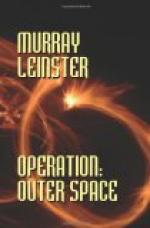It was. But Cochrane found himself not needed for any consultation, and Jones was busy, and Bill Holden highly preoccupied. He saw Alicia Keith—but her name was Simms now. She smiled at him but took Babs by the arm. They went off somewhere.
Cochrane waited for somebody to tell him what to look at and to admire. He saw Jamison, and Bell, and he saw a man he had not seen before. He settled down in a deeply upholstered chair. He felt neglected. Everybody was busy. But mostly he felt tired.
He slept.
Then Babs was shaking his arm, her eyes shining.
“Mr. Cochrane!” she cried urgently. “Mr. Cochrane! Wake up! Go on up to the control-room! We’re going to take off!”
He blinked at her.
“We!” Then he started up, and went five feet into the air from the violence of his uncalculated movement. “We? No you don’t! You go back to Lunar City where you’ll be safe!”
Then he heard a peculiar drumming, rumbling noise. He had heard it before. In the moonship. It was rockets being tested; being burned; rockets in the very last seconds of preparation before take-off for the stars.
He didn’t drop back to the floor beside the chair he’d occupied. The floor rose to meet him.
“I’ve had our baggage brought on board,” said Babs, happily. “I’m going because I’m a stockholder! Hold on to something and climb those stairs if you want to see us go up! I’m going to be busy!”
CHAPTER FIVE
The physical sensations of ascending to the ship’s control-room were weird in the extreme. Cochrane had just been wakened from a worn-out sleep, and it was always startling on the moon to wake and find one’s self weighing one-sixth of normal. It took seconds to remember how one got that way. But on the way up the stairs, Cochrane was further confused by the fact that the ship was surging this way and swaying that. It moved above the moon’s surface to get over the tilted flat Dabney field plate on the ground a hundred yards from the ship’s original position.
The Dabney field, obviously, was not in being. The ship hovered on its rockets. They had been designed to lift it off of Earth—and they had—against six times the effective gravity here, and with an acceleration of more gravities on top of that. So the ship rose lightly, almost skittishly. When gyros turned to make it drift sidewise—as a helicopter tilts in Earth’s atmosphere—it fairly swooped to a new position. Somebody jockeyed it this way and that.
Cochrane got to the control-room by holding on with both hands to railings. He was angry and appalled.
The control-room was a hemisphere, with vertical vision-screens picturing the stars overhead. Jones stood in an odd sort of harness beside a set of control-switches that did not match the smoothly designed other controls of the ship. He looked out of a plastic blister, by which he could see around and below the ship. He made urgent signals to a man Cochrane had never seen before, who sat in a strap-chair before many other complex controls with his hands playing back and forth upon them. A loudspeaker blatted unmusically. It was Dabney’s voice, highly agitated and uneasy.




